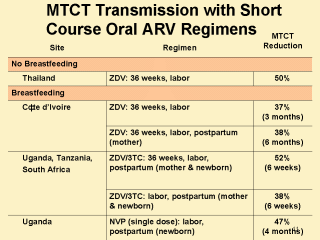 |
Another
way to prevent transmission of HIV is by providing antiretroviral treatment to pregnant
women to decrease mother-to-child transmission. This method of transmission has
dramatically declined in developed countries. In early 1994, the results of the Pediatric
AIDS Clinical Trials Group (PACTG) 076 showed a 66% reduction in MTCT with use of
zidovudine or AZT given at 14 weeks gestation and continuing through the remainder of
pregnancy, during labor by intravenous infusion, and to the newborn for the first 6 weeks
of life. Perinatal transmission rates have subsequently decreased by approximately 80% in
the United States. This regimen, however, is both too costly and too complex for
limited-resource settings. Since the PACTG 076 study
there have been several clinical trials of more abbreviated oral regimens in both
breastfeeding and nonbreastfeeding populations in limited-resource countries and these
show efficacy ranging from 37% to 52% in reduction of MTCT. The most exciting of these and
the most cost-effective is the use of a single dose of nevirapine to the mother at the
onset of labor and a single dose to the newborn within the first 48-72 hours of life; this
was conducted in a breastfeeding population in Uganda and resulted in a 47% reduction in
mother-to-child transmission at 4 months followup, as compared to oral zidovudine given to
the mother in labor and for one week to the newborn. |
